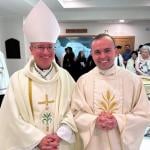Last updated on: February 3, 2017 at 5:51 pm
By
CNA Daily News
Chur, Switzerland, Feb 3, 2017 / 10:51 am (CNA/EWTN News).- Referring extensively to Pope Francis' writing in Amoris laetitia, a Swiss bishop on Thursday gave direction on how to implement the exhortation, emphasizing respect for the sanctity of the marriage bond. “The task of pastoral care is to convey to the people an awareness of the sanctity of the marriage bond, or to convey it again,” Bishop Vitus Huonder of Chur wrote in his Feb. 2 letter “The Holiness of the Marriage Bond”. After an extensive introduction which quoted at length from Amoris laetitia, Bishop Huonder asked the priests of the Chur diocese to observe nine points, the first of which is that “the starting point for accompaniment, discernment, and integration must be the sanctity of the marriage bond.” He emphasized the holiness of marriage, present in the natural order and strengthened in sacramental one. “The formation of conscience regarding this truth is an urgent task in our time,” he noted. “The marriage bond itself is a gift of the love, wisdom, and mercy of God, which grants to the spouses grace and help. Therefore, reference to the marriage bond must be the first step in accompanying, discerning, and integrating,” Bishop Huonder wrote. The bishop directed that if, during a confession, a priest sees that there are questions about the penitent's state of life that need to be clarified, he should ask the penitent to begin a longer process of penitence and integration. “In the pastoral care and accompaniment of divorced-and-civilly-remarried persons it is first necessary to examine whether the marriage contract (the “first marriage”) was valid,” Bishop Huonder said. “This examination cannot be made by the individual priest, and especially not in the confessional,” and he alluded to the necessary role of the tribunal in investigating validity. “Whatever is found out about the validity of the marriage, a failed marriage must in any case be dealt with humanely and faithfully,” he emphasized. “This means that a longer pastoral path, demanding patience, must be pursued.” Bishop Huonder noted that “the reception of Holy Communion by the divorced-and-civilly-remarried may not be left up to a subjective decision,” and it is thus “necessary to be able to rely on objective conditions.” “In the case of divorced-and-civilly-remarried persons, respect for the existing marriage bond is crucial.” If a divorced-and-remarried penitent requests absolution, the confessor must establish that if they cannot separate from their partner, they are willing to take on the duty to live as brother and sister, as directed by St. John Paul II's 1981 apostolic exhortation Familiaris consortio. “This remains the case because the new apostolic exhortation Amoris Laetitia expressly does not provide a 'a new set of canonical rules' (cf. AL 300). The penitent will first have to manifest a firm intention to live in respect of the marriage bond of their 'first' marriage.” Bishop Huonder concluded by exhorting priests to always keep in mind the words of St. Paul that “this is a great mystery. I speak of Christ and the Church.” Please find below the full text of Bishop Huonder's letter, translated by CNA: The Holiness of the Marriage Bond – A word on the post-synodal apostolic exhortation Amoris Laetitia Dear brothers in the priestly ministry, In the discussion around the post-synodal apostolic exhortation Amoris Laetitia, the eighth chapter centers on the question of divorced-and-civilly-remarried persons. For this reason I give, in my responsibility as bishop, some advice on this to pastors (confessors). I would like to express the following: The Holy Father says in the introduction to Amoris Laetitia “that not all discussions of doctrinal, moral or pastoral issues need to be settled by interventions of the magisterium” (AL 3). This statement helps us recognize the level of authority of post-synodal apostolic exhortations. “If we consider the immense variety of concrete situations … it is understandable that neither the Synod nor this Exhortation could be expected to provide a new set of general rules, canonical in nature and applicable to all cases. What is possible is simply a renewed encouragement to undertake a responsible personal and pastoral discernment of particular cases” (AL 300), says the Pope in the context of the discernment of irregular situations. This means, however, that the bishop is all the more required to speak a word of direction, because priests have the task to “accompany [the divorced and remarried] in helping them to understand their situation according to the teaching of the Church and the guidelines of the bishop” (AL 300). Further, “every effort should be made to encourage the development of an enlightened conscience, formed and guided by the responsible and serious discernment of one’s pastor, and to encourage an ever greater trust in God’s grace” (303). This is precisely what the Holy Father, in Amoris Laetitia 307, says: “'Young people who are baptized should be encouraged to understand that the sacrament of marriage can enrich their prospects of love and that they can be sustained by the grace of Christ in the sacrament and by the possibility of participating fully in the life of the Church'. A lukewarm attitude, any kind of relativism, or an undue reticence in proposing that ideal, would be a lack of fidelity to the Gospel and also of love on the part of the Church for young people themselves.” Given all of these passages in Amoris Laetitia I ask priests to observe the following: 1. The starting point for accompaniment, discernment, and integration must be the sanctity of the marriage bond. The task of pastoral care is to convey to the people an awareness of the sanctity of the marriage bond, or to convey it again. The Holy Father speaks of “pastoral care … centred on the marriage bond” [Seelsorge der Bindung] (AL 211; in the Italian it reads vincolo). The official German translation of vincolo with Bindung [connection] is too weak. Therefore I speak explicitly of the bond. 2. As the marriage bond is already holy from creation (natural marriage), the more so is it from the new creation (the order of redemption) though sacramental marriage (the supernatural order). The formation of conscience regarding this truth is an urgent task in our time (cf. AL 300). 3. This formation of conscience is all the more necessary because a pastor cannot be content “simply to apply moral laws to those living in 'irregular' situations, as if they were stones to throw at people’s lives” (AL 305). The marriage bond itself is a gift of the love, wisdom, and mercy of God, which grants to the spouses grace and help. Therefore, reference to the marriage bond must be the first step in accompanying, discerning, and integrating. 4. If a confessor, in the course of a confession with an unknown penitent (at an 'occasional confession'), recognizes questions about the marriage bond which need clarification, he will ask the penitent to confide in a priest who can accompany him on a longer path of repentance and integration; or the penitent will contact the confessor himself outside of the confession. 5. In the pastoral care and accompaniment of divorced-and-civilly-remarried persons it is first necessary to examine whether the marriage contract (the “first marriage”) was valid, whether a marriage bond truly exists. This examination cannot be made by the individual priest, and especially not in the confessional. The confessor must refer the person concerned to a diocesan official. 6. Whatever is found out about the validity of the marriage, a failed marriage must in any case be dealt with humanely and faithfully. This means that a longer pastoral path, demanding patience, must be pursued. “Useful in this process is an examination of conscience through moments of reflection and repentance. The divorced and remarried should ask themselves: how did they act towards their children when the conjugal union entered into crisis; whether or not they made attempts at reconciliation; what has become of the abandoned party; what consequences the new relationship has on the rest of the family and the community of the faithful; and what example is being set for young people who are preparing for marriage. A sincere reflection can strengthen trust in the mercy of God which is not denied anyone” (AL 300). “The Church’s pastors, in proposing to the faithful the full ideal of the Gospel and the Church’s teaching, must also help them to treat the weak with compassion, avoiding aggravation or unduly harsh or hasty judgements” (AL 308). 7. The reception of Holy Communion by the divorced-and-civilly-remarried may not be left up to a subjective decision. It is necessary to be able to rely on objective conditions (on the Church's prescriptions for the reception of Holy Communion). In the case of divorced-and-civilly-remarried persons, respect for the existing marriage bond is crucial. 8. If during a conversation (in the case of confession) the absolution of a divorced-and-civilly-remarried person is requested, it must be established that this person is ready to accept the prescriptions of Familiaris consortio 84. That is: where, for serious reasons … a man and woman cannot satisty the obligation to separate (cf. AL 298), they are called to live as brother and sister. This remains the case because the new apostolic exhortation Amoris Laetitia expressly does not provide a “a new set of canonical rules” (cf. AL 300). The penitent will first have to manifest a firm intention to live in respect of the marriage bond of their “first” marriage. 9. In the preparation and accompaniment of the engaged, spouses, and families, let us remember always the words of St. Paul: “This is a great mystery. I speak of Christ and the Church. (Eph 5:32)” – Sacramentum hoc magnum est, ego autem dico in Christo et in Ecclesia. With my thanks for your fidelity to the Lord and his mission, I cordially greet you, together with my episcopal blessing. Chur, 2 February 2017 +Vitus Huonder, Bishop of Chur Read more














